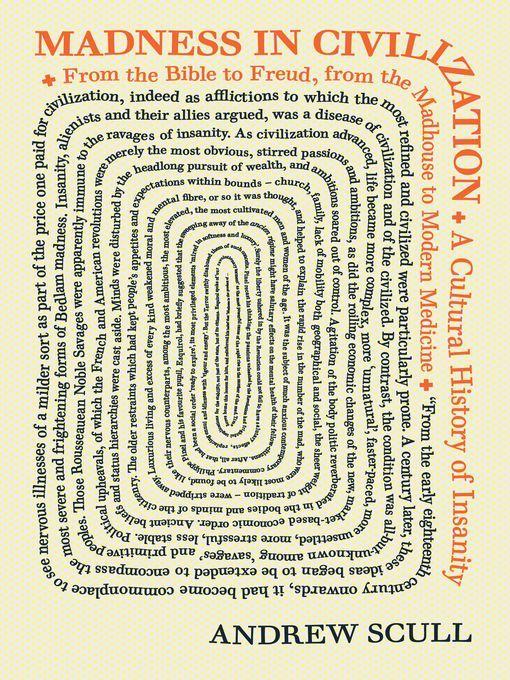
Madness in Civilization
A Cultural History of Insanity, from the Bible to Freud, from the Madhouse to Modern Medicine
کتاب های مرتبط
- اطلاعات
- نقد و بررسی
- دیدگاه کاربران
نقد و بررسی

Starred review from March 1, 2015
Far-ranging, illuminating study of minds gone awry across space and time.Scull (Sociology and Science Studies/Univ. of California, San Diego; Madness: A Very Short Introduction, 2011, etc.), a specialist in the history of science, warns at the outset that the very word "madness" is laden with cultural baggage: our idea of the subject, limned by the Diagnostic and Statistical Manual of Mental Disorders and various psychotropic medications, would likely be alien to a maenad-beset Greek of old. "We run enormous risks of misconstruing history," he writes, "when we project contemporary diagnostic categories and psychiatric understandings back on to the past." Still, when we look at Achilles, we can see PTSD, just as Mozart is better explained by throwing a little bipolarity into the picture. Though careful, Scull allows some imaginative readings into his long but utterly absorbing tour of history from ancient times to our own. Without overexplaining, he looks at medical controversies through time in familiar ways. The anti-vaccination crowd takes on different colors when seen as modern-day followers of the old temple gods: "If these methods did not bring about the desired result, failure could always be explained away. The gods were still displeased, the prayers insufficiently fervent." Just so, by Scull's account, traditional Chinese medicine, beloved of so many today, represents a victory of conservatism over progress, though Chinese physicians did tend to eventually reject the idea of wind-caused madness. Scull is sharp on every point, but some of his best moments come when he explains the introduction of psychoanalysis into pop culture in the postwar period, thanks in good part to Hollywood, and when he takes a sidelong look at both the drug-dependent psychiatry of today and its discontents, such as Scientology. To be read as both corrective and supplement to Foucault, Szasz, and Rieff. Often brilliant and always luminous and rewarding.

Starred review from April 1, 2015
Scull (sociology & science studies, Univ. of California at San Diego; coauthor, Masters of Bedlam) covers ancient times to the contemporary psychiatric revolution with deep understanding. Madness--the underside of civilization, says Scull--is and was terribly uncivil; supposedly normal society has, for the most part, failed to help its victims. Scull handles this large topic well, with writing skill equal to his vast knowledge of history, both civil and mad. Skeptical about the "psychiatric revolution" that places great emphasis on medication, he is blunt about treatment of severe and chronic mental illness today. False optimism about deinstitutionalization resulted from reticence of families to complain, he says, but "community care was a shell game with no pea." Scull's knowledge of music and art, cultural change, medicine, religion, and politics make this a great achievement in psychiatric history. This dynamic, readable chronicle and excellent reference includes 100-plus well-chosen illustrations, a number of which are in color. VERDICT Essential for most libraries, this is a gift to lay readers as well as psychologists, sociologists, and historians.--E. James Lieberman, George Washington Univ. Sch. of Medicine, Washington, DC
Copyright 2015 Library Journal, LLC Used with permission.

























دیدگاه کاربران